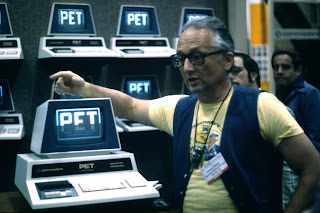Meeting Chuck Peddle
by Leonard Tramiel
Shortly after Commodore bought MOS Technology Dad told me that he needed my help to evaluate a proposal he had been been given by an MOS employee. Chuck Peddle told my father that he was going to build a personal computer. If Commodore wanted the product he would do it as an employee. If they didn't them he would quit and do it on his own. The fact that dad wanted my opinion was quite a shock. I was in my early 20s at the time and the idea that my dad would ask for my help on a business decision was unprecedented.
I had worked at Commodore during the summers while in college. Starting with working in the warehouse. One summer, based on my interest in science and technology I learned to repair electronic calculators. Yes, there was a time when that was possible. I learned a LOT that summer. During a later summer I went to work with dad and went to the group designing Commodore's most advanced calculators. These were based on fully custom chips of this group's design and running firmware written by them. Dad introduced me to the head of the group saying: "This is my son. Give him something useful to do". I was handed the instruction set for the custom processor and the firmware listing for a four function calculator and told "Come back when you understand". That summer I wrote the firmware for 3 calculators. I learned even more.
I hadn't realized it, but dad had come to trust me on technical questions. We went to a trade show in southern California where MOS Technology had a booth where they were displaying the 6502 and the MDT development system. As an example of the ease of development they had a pinball game that had been developed in 3 weeks. We met Chuck Peddle and, in one of the strangest conversations I've ever had, he described the world he wanted to live in. It was the world in a sci-fi story we had both read, The Door into Summer by Robert Heinlein. Chuck was an absolute visionary and I got completely absorbed in the vision of the world he was describing. One where nearly everything had a computer in it. Chuck thought that before people would accept this kind of world they would need to be comfortable with computers so he wanted build a machine that was inexpensive but powerful enough to learn to program and experience the power of personal computing. Before that there needed to be a very inexpensive yet powerful microprocessor, so he spearheaded development of the 6502. Now it was time to go on to the next step. He described a computer very much like the PET. I lost track of time and I really can't say how long we spoke. I tried to portray the vision to dad and I succeeded well enough that he gave the go ahead for the project. Chuck moved out to California, assembled a small team to produce, in an astoundingly short time, the PET computer.


